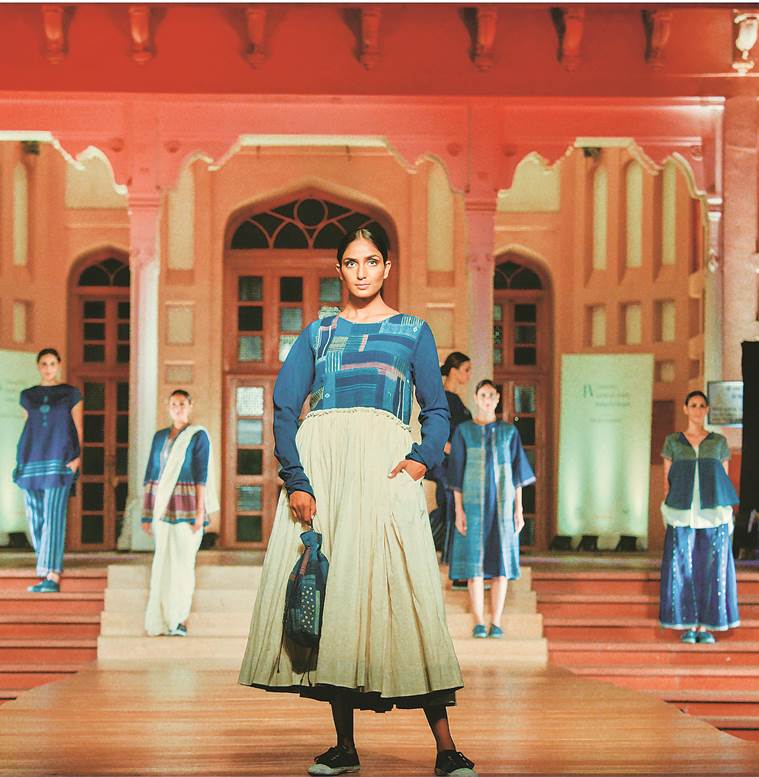
IN FEBRUARY, at the “Walking Hand in Hand” runway show in Ahmedabad, conceptualised by the Crafts Design Society Art Foundation, designer Paromita Banerjee sent out a patchwork yoke dress as the finale outfit of her collection. Dyed in shades of blue, the collection used naturally dyed indigo kala cotton, created in alliance with master weaver Vankar Shamji Vishram of Bhujodi, Kutch. For Kolkata-based Banerjee, it was the culmination of a fulfilling creative partnership and the patchwork dress, accessorised by a patchwork ‘potli’, was the embodiment of her brand’s continuing philosophy. Banerjee used every last inch of the fabric crafted by Vishram, employing leftovers into creating patchwork ensembles, as yokes, trims, potlis (drawstring bag) and buttons, an exercise she started in 2011, as part of her eponymous label’s endeavour to ingeniously upcycle.
Banerjee started patching up “leftover stories of past collection” out of pure and simple greed. “We don’t source fabric; we envisage it from the loom stage and work with the weavers to make it from scratch, so we become quite sentimental about throwing away any pieces,” says Banerjee.
Puducherry-based eco-conscious designer Naushad Ali collects all the scraps that fall on the floor in his production line and segregates them into categories of fabric type, colour and size as a daily practice. “These cast offs are then patched together and used to make a garment,” he explained on the sidelines of the annual International Fashion Showcase (IFS) during London Fashion Week, where his patchwork creations were on display in February.

While the humble patchwork may be enjoying the trend spotlight this year, also making its way into runway collections of international and Indian labels like Coach, Isabel Marant, Missoni, Pero, Payal Pratap, Doodlage, Indigene, Yavi and Diksha Khanna, among others, for many of these design talents it has become more than a cyclical seasonal offering. Drawing reference from traditional quilting techniques like kantha and sujini and the globally-lauded Japanese boro textiles, which follow a similar method of mending and patching together, these designers are giving the patchwork story a whole new narrative, even making it part of their brand’s design lexicon.
For Yadvi Agarwal of Yavi, repurposing textiles came naturally. “While getting a garment stitched from fabrics, my mother would make a kurta for herself, a top for me and a potli bag out of the scraps. Growing up seeing her being so innovative with waste fabrics inspired me,” recalls Agarwal. Her one-year-old label, with its art-meets-fashion ideology, aims to repurpose fabric waste into mindful products. “We have approached our process of upcycling not just through patchwork and adding value with kantha stitch details, but also with the use of eco-dyeing with waste rose and marigold petals from temples to create unique impressions on the garments,” says Agarwal.
What attracted contemporary menswear label Kardo’s founder and creative director Rikki Kher were the infinite possibilities of innovation and patterning the technique brings to the table. “We are very interested in the abstract play of fabric, since our label is all about textiles,” says Kher. While he has sourced patchwork fabric for earlier collections, for his most recent endeavour he has created his own fabric by stitching together Madras handkerchiefs. Given his label’s sustainable credentials and its ‘one piece by one tailor’ policy, it has proven to be a worthy challenge to tackle. “The idea was to use existing products and resources that are already available in the market. We also enjoy the playfulness of it and like the idea of the randomness that comes with a packet of Madras handkerchiefs,” says Kher, who further upcycles fabric waste into bucket hats, sling bags, wallet linings and so on.
Banerjee’s patchwork leather slings, laptop covers and notebook ‘khata’ covers are also hotsellers, as consumers are beginning to understand and appreciate the merits of upcycling. “We have all grown up in houses that repurpose products — from plastic bottles to waste fabrics. Today’s Indian consumer is starting to acknowledge how these processes of upcycling and recycling add design value to the products in the fashion industry as well,” says Agarwal. After all, as Naushad Ali would aptly say, “Waste is a design flaw.”